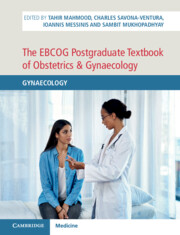Book contents
- The EBCOG Postgraduate Textbook of Obstetrics & Gynaecology
- The EBCOG Postgraduate Textbook of Obstetrics & Gynaecology
- Copyright page
- Dedication
- Contents
- Videos
- Contributors
- Preface
- Section 1 Basic Sciences in Gynaecology
- Section 2 Menstrual Disorders
- Section 3 Reproductive Endocrinology and Infertility
- Chapter 11 Primary and Secondary Amenorrhoea
- Chapter 12 Recurrent Pregnancy Loss in the First and Second Trimesters
- Chapter 13 Polycystic Ovary Syndrome
- Chapter 14 Hirsutism and Virilism
- Chapter 15 Female and Male Infertility
- Chapter 16 Assisted Conception Techniques
- Chapter 17 Ovarian Hyperstimulation Syndrome
- Chapter 18 Legal and Ethical Issues in Assisted Conception Treatment
- Chapter 19 Premature Ovarian Insufficiency
- Section 4 Contraception and STIs
- Section 5 Post-Reproductive Care
- Section 6 Vulva and Vagina
- Section 7 Cervix
- Section 8 Uterus
- Section 9 Ovary and Fallopian Tubes
- Section 10 Operative Gynaecology
- Section 11 Public Health Issues in Gynaecology
- Section 12 Miscellaneous
- Index
- Plate Section (PDF Only)
- References
Chapter 13 - Polycystic Ovary Syndrome
from Section 3 - Reproductive Endocrinology and Infertility
Published online by Cambridge University Press: 24 November 2021
- The EBCOG Postgraduate Textbook of Obstetrics & Gynaecology
- The EBCOG Postgraduate Textbook of Obstetrics & Gynaecology
- Copyright page
- Dedication
- Contents
- Videos
- Contributors
- Preface
- Section 1 Basic Sciences in Gynaecology
- Section 2 Menstrual Disorders
- Section 3 Reproductive Endocrinology and Infertility
- Chapter 11 Primary and Secondary Amenorrhoea
- Chapter 12 Recurrent Pregnancy Loss in the First and Second Trimesters
- Chapter 13 Polycystic Ovary Syndrome
- Chapter 14 Hirsutism and Virilism
- Chapter 15 Female and Male Infertility
- Chapter 16 Assisted Conception Techniques
- Chapter 17 Ovarian Hyperstimulation Syndrome
- Chapter 18 Legal and Ethical Issues in Assisted Conception Treatment
- Chapter 19 Premature Ovarian Insufficiency
- Section 4 Contraception and STIs
- Section 5 Post-Reproductive Care
- Section 6 Vulva and Vagina
- Section 7 Cervix
- Section 8 Uterus
- Section 9 Ovary and Fallopian Tubes
- Section 10 Operative Gynaecology
- Section 11 Public Health Issues in Gynaecology
- Section 12 Miscellaneous
- Index
- Plate Section (PDF Only)
- References
Summary
Polycystic ovary syndrome (PCOS) is the most common endocrinopathy in women during reproductive life. The aetiology of the syndrome is unknown; however, many endocrine changes occur, such as insulin resistance and hyperinsulinaemia, hyperandrogenaemia, elevated LH and increased anti-Müllerian hormone, which contribute to the pathogenesis of the syndrome. There are three main characteristics which play key roles in the definition of the syndrome – menstrual irregularities, hyperandrogenism and polycystic morphology of the ovaries – but there is no consensus as to the gravity of each of these features. The management of the syndrome depends on the prevailing symptom and whether the woman is interested in becoming pregnant or not. Combined oral contraceptive pills, diet, lifestyle changes, ovulation-inducing drugs and in-vitro fertilization are the main means of treating the syndrome. Treatment should also take into account possible long-term consequences of this condition, such as metabolic syndrome and cancer development.
Keywords
- Type
- Chapter
- Information
- The EBCOG Postgraduate Textbook of Obstetrics & GynaecologyGynaecology, pp. 108 - 116Publisher: Cambridge University PressPrint publication year: 2021

